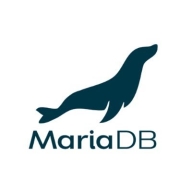

SQL Server and MariaDB compete in the database management systems category. Based on the data, SQL Server seems to have the upper hand due to its extensive features and reliability, despite its higher costs compared to the open-source model of MariaDB.
Features: SQL Server offers high availability, scalability, and user-friendliness. It integrates seamlessly with cloud services and supports easy setup and deployment. MariaDB is valued for being open-source, stable, and cost-effective, offering strong performance in complex relationships, columnar queries, and flexibility.
Room for Improvement: SQL Server could enhance integration with other platforms and improve its indexing and performance tools. The cost can be a barrier for small businesses. MariaDB should enhance its error handling, clustering, and replication capabilities. Better support for large-scale transactions and broader integration tools would be an improvement.
Ease of Deployment and Customer Service: SQL Server is versatile across on-premises, hybrid, and cloud environments with generally satisfactory Microsoft support, varying by issue complexity. MariaDB excels in on-premises and hybrid setups, relying on community-based troubleshooting due to limited corporate support, which poses challenges in complex deployments.
Pricing and ROI: SQL Server has high enterprise licensing fees but provides good ROI through its features and performance, with manageable costs in smaller setups. Conversely, MariaDB leverages a free open-source model, offering cost savings and quicker ROI, especially appealing to budget-conscious users who do not need extensive service support.


MariaDB is an open source relational database created by the original founders of MySQL. It is considered one of the most popular and trusted database servers throughout the world. MariaDB is a valued component found in most cloud offerings and is the default in many Linux tools. It is also widely used by Wikipedia, WordPress, and Google, among other well-known sites. Maria DB easily melds data into concise information from a vast array of applications, such as banking, online shopping, websites, and more.
MariaDB was originally created to improve MySQL performance. It is the most widely chosen database server due to the solution being super fast, robust, user-friendly, and easily scalable. MariaDB also offers a substantial ecosystem of plugins, storage engines, and numerous other valuable tools that make it very attractive for a significant offering of use cases.
The solution’s newest functionalities include compatibility with Oracle Database and Temporal Data Tables, and advanced clustering with Galera Cluster 4, which make it easier for users to research data history from any point in the past. Additionally, the most recent versions include JSON and GIS features. MariaDB is committed to staying an open source solution.
MariaDB Features
Reviews from Real Users
Faustine C., Engineering Supervisor- Corporate Data Solutions and Services at TZ Telecoms Corporation, shares, “The software provides a lot of information on what is happening inside the database. For most performance parameters it is easy to know if something is not right in the configuration or optimization which helps engineers take remedial fine-tuning measures. For example, if the database is underperforming it is easy to know which performance parameter can be adjusted to handle the workload. It is difficult to troubleshoot database issues if many performance parameters can not be monitored or debugged which is the case with some database management systems. It provides great monitoring of data storage, processing, and performance stability which is really important for real-time data storage and processing. It's a user-friendly product.”
A PeerSpot user who is a Senior Engineer at a tech services company relates, “ The solution's high availability is its most valuable aspect. We have found the product to be stable and the initial setup is pretty simple. I'd rate the solution at a ten out of ten. I'm very happy with it overall. I would recommend the solution to others. It's easy to find details about the product online and to learn about it.”
SQL Server is a relational database management system (RDBMS) by Microsoft. The product's main purposes are to store data and retrieve it as requested by other software applications - on the same computer or on another computer across a shared network. The solution is built on top of Structured Query Language (SQL), which is a standardized programming language used for relational database management.
The product is tied to Transact-SQL (T-SQL), which is an implementation of SQL from Microsoft that adds several proprietary programming extensions to the standard language. SQL Server is built similarly to other RDBMS products, as its structure is a row-based table that connects related data elements in different tables to one another. One of its most important components is the SQL Server Database Engine, as it controls data processing, storage, and security. Beneath the Database Engine is the SQL Server Operating System, which is used for memory and I/O management, locking data to avoid unneeded upgrades, and job scheduling.
The solution has four editions with different sets of services and tools. They include:
The first two are available for free and are typically utilized by smaller companies, as they work with fewer functions and storage. The second two editions are generally used by bigger organizations and enterprises and offer more features.
The solution has several functions through which users can facilitate different data-related processes. These include:
SQL Server Services
SQL Server has a wide range of add-on services that provide additional benefits beyond database management. These services include:
SQL Server Benefits
The solution has many benefits for users. These include the following:
Reviews from Real Users
A president at a consultancy evaluates SQL Server as a veteran solution with critical log shipping feature.
Harkamal S., a user at a manufacturing company, rates SQL Server with a high mark because it is a stable, scalable, and easy-to-deploy solution that pretty much covers everything.
We monitor all Relational Databases Tools reviews to prevent fraudulent reviews and keep review quality high. We do not post reviews by company employees or direct competitors. We validate each review for authenticity via cross-reference with LinkedIn, and personal follow-up with the reviewer when necessary.